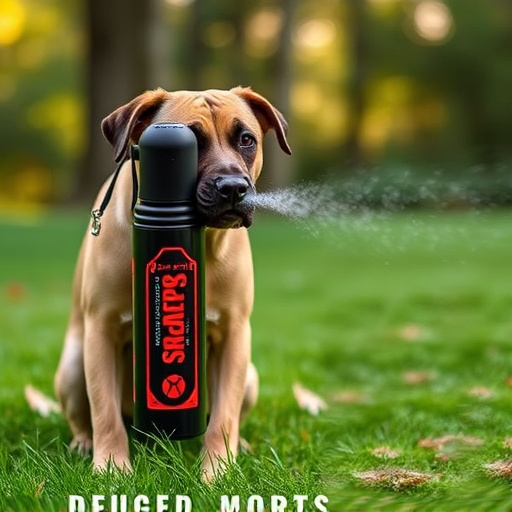Dog pepper spray, though popular for personal protection against aggressive dogs, faces strict regulations or bans in many U.S. states, known as Dog Pepper Spray Restricted States. Its usage requires understanding local laws and safety guidelines, with advocates debating its role as a last-resort defense mechanism after other de-escalation methods fail. It's crucial to check state laws before purchasing or carrying dog pepper spray, and always store it securely following proper handling and disposal instructions.
In today’s world, personal safety is paramount, especially when encountering potentially aggressive dogs. Dog pepper spray emerges as a non-lethal self-defense option, offering individuals a powerful yet controlled means of protection. This article delves into the intricacies of dog pepper spray, exploring its legality in restricted states and providing essential tips for effective use and safety. Understanding this unique defense mechanism is crucial, especially for those navigating areas with stringent regulations on such products.
- Understanding Dog Pepper Spray: A Non-Lethal Self-Defense Option
- Legal Considerations: Dog Pepper Spray in Restricted States
- Effective Use and Safety Tips for Dog Pepper Spray
Understanding Dog Pepper Spray: A Non-Lethal Self-Defense Option
Dog pepper spray is a non-lethal self-defense option gaining popularity for its effectiveness against potential threats. It’s designed to incapacitate an aggressor temporarily, giving users time to escape or seek help. However, it’s crucial to understand that dog pepper spray isn’t legal everywhere; there are specific Dog Pepper Spray Restricted States where its use is heavily regulated or outright banned.
Knowing the laws in your area is essential before considering this option. Each state has its own set of restrictions and guidelines on who can possess and use dog pepper spray, as well as where and under what circumstances it’s legal to do so. Despite these restrictions, many advocates argue that non-lethal self-defense options like dog pepper spray play a crucial role in empowering individuals to protect themselves, especially when facing potentially dangerous situations.
Legal Considerations: Dog Pepper Spray in Restricted States
The legality of using dog pepper spray, also known as capsaicin spray, varies significantly across different states in the US. While it can be a powerful tool for personal protection against aggressive dogs, its use is strictly regulated and considered a restricted practice in many areas. Dog pepper spray is often viewed through a lens of public safety, with concerns regarding potential misuse and animal welfare at the forefront.
In states where dog pepper spray is banned or heavily restricted, citizens must navigate alternative self-defense options. This usually involves learning and employing non-lethal techniques to deter attacks, such as noise makers, flashlights, or other personal protection devices specifically permitted under local laws. Understanding these legal considerations is essential for dog owners and enthusiasts when considering the use of pepper spray in areas where it’s prohibited to ensure they remain compliant with state regulations.
Effective Use and Safety Tips for Dog Pepper Spray
Using dog pepper spray can be an effective deterrent and defense mechanism for owners facing aggressive or unpredictable dogs. However, it’s crucial to understand its proper usage and safety considerations. Dog pepper spray should only be deployed as a last resort when other de-escalation tactics have failed. Aim for the eyes, nose, or mouth of the approaching dog, releasing the spray in short bursts from a safe distance (typically 4-6 feet). This approach minimizes wind dispersion, ensuring the spray stays on target and doesn’t blow back towards you.
When using dog pepper spray, always follow local regulations. Dog pepper spray is restricted in several states due to its potential for misuse and unintended consequences. Before purchasing or carrying any form of pepper spray, check your state’s laws regarding its possession, use, and restrictions. Additionally, keep the spray out of reach of children and pets, store it in a secure location, and ensure you’re familiar with the product’s instructions for proper handling and disposal to maintain safety.
Dog pepper spray offers a non-lethal self-defense option for dog owners, but its legality varies across states. While it can be an effective deterrent against aggressive dogs, users must adhere to safety guidelines and understand the specific regulations in their restricted states. By staying informed and practicing responsible use, individuals can ensure they have a safe and legal tool to protect themselves and their pets.
